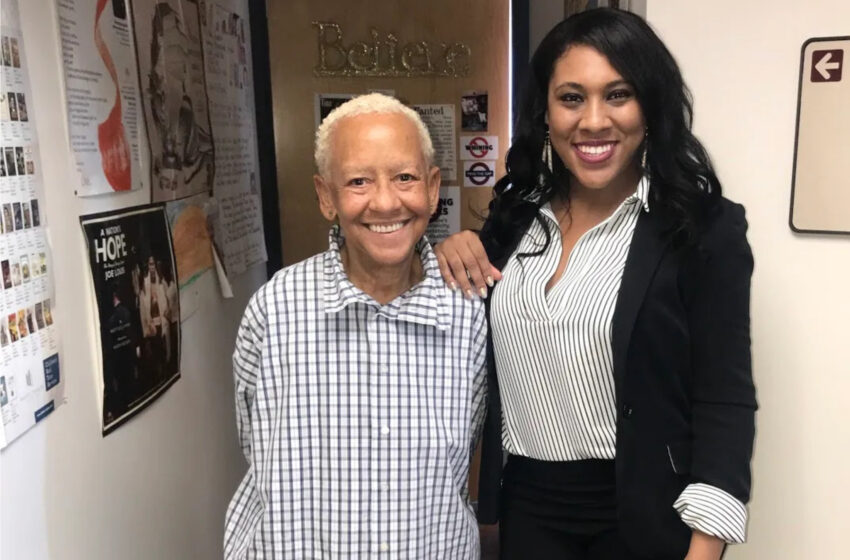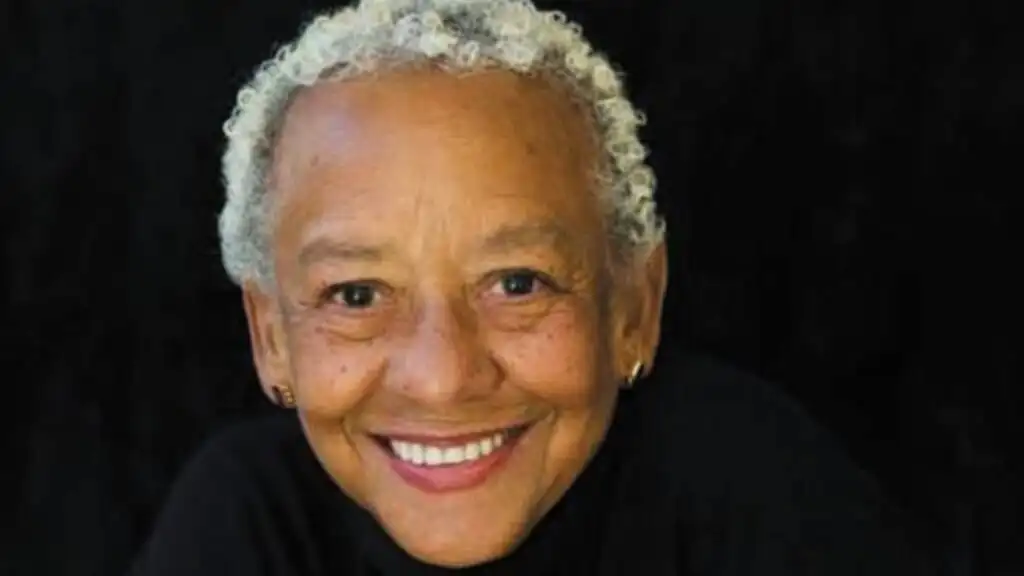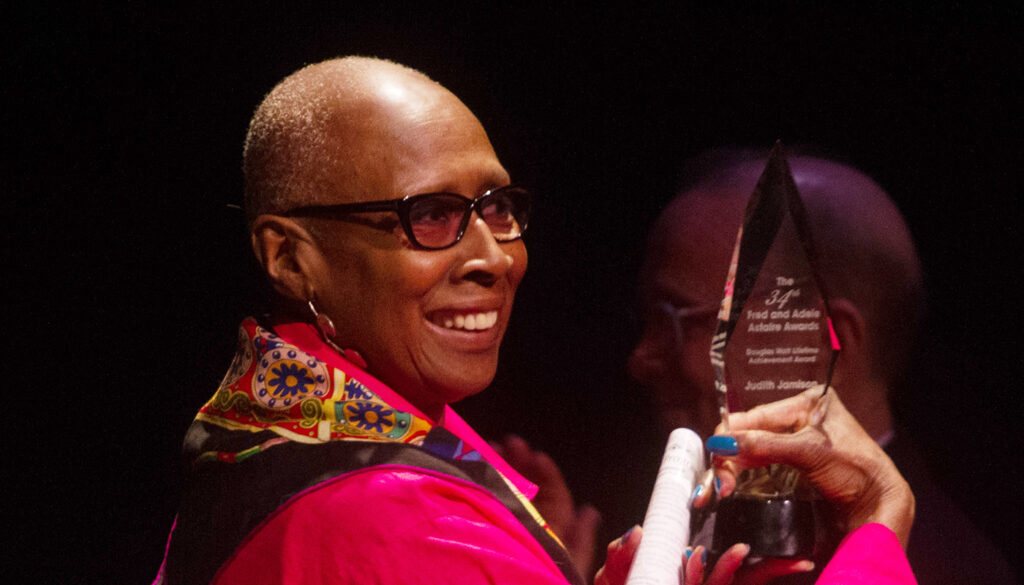Remembering Nikki Giovanni: Revolutionary Poet on Protest, Poetry, and Legacy

Nikki Giovanni with Editor-in-Chief, Dontaira Terrell
The Black Arts Movement was considered one of the most prolific of the mid-1960s and 1970s. Inspired by the Black Power movement, it was a creative collective of politically conscious poets, composers, and writers who opposed the notion of traditional Western values. These revolutionary artists created new channels for the culture, and among them was Nikki Giovanni.
Born Yolande Cornelia Giovanni, Jr., the 76-year-old is the embodiment of “wokeness.” That one of her recent poems in her latest collection, A Good Cry (2017), is appropriately titled “Black Lives Matter (Not a Hashtag),” is just another example of how she uses her powerful tools of self-expression to draw parallels between poetry and protest.
Recognized as the “Poet of Black Revolution,” Giovanni has taken on topics from race relations and social justice to Black women’s empowerment. More than 50 years after the release of her first published body of work, Black Feeling, Black Talk/Black Judgement (1968), her radicalism is still a force to be reckoned with. I traveled to the campus of Virginia Tech University in Blacksburg, VA, to interview the renowned author, who’s been with the university since 1987.
This interview has been edited and condensed for clarity.
ZORA: How did growing up in Ohio during the 1940s and 1950s shape you into the woman you are today?
Nikki Giovanni: Honestly, I don’t know how I would have been shaped without my upbringing in Ohio. How do you subtract who you are from what you are (laughs)? The answer is simple. You can’t. But what affected me the most was my time in Knoxville, TN. I lived with my grandparents during my formative years as a teenager in high school.
I wrote a poem called “Nikki Rosa,” and the first line is, “Childhood remembrances are always a drag if you’re Black.” I believe those are the years you look back on to make a decision about whether or not you were happy. In hindsight, you probably weren’t because it is really hard to think of being happy, and despite what people say, most aren’t.
How critical is your impact at a predominantly White institution such as Virginia Tech?
I was recruited by Virginia Tech’s English department to teach here. Although I have been here for 32 years, this was the first real job I had where I received a paycheck every two weeks with health care. I believe all of us have to recognize if we are going to have an integrated society, then we have to integrate.
In an evening class that I teach, I have four wonderful young Black girls. When I came to the first two classes, they were sitting in the back together and I wondered why. By the third class, I approached them and told them people died, so they didn’t have to sit together. As a member of Delta Sigma Theta Sorority, Inc., I gave them a brief history of our organization. I told them about the Deltas marching with Susan B. Anthony back in 1920. It is something very important to know.
Dr. Martin Luther King Jr. walked over the Selma bridge, and a lot of people worked very, very hard to see to it these young ladies didn’t have to sit in the back. As their professor at a predominantly white institution, I explained to them that I couldn’t allow them to sit together in the back because it would go against everything we fought for. We all paid a price. In my day, during the age of segregation, we had to break it down. Now, in the present day of segregation actually being broken down, we have to utilize it, whether you like it or not.
She uses her powerful tools of self-expression to draw parallels between poetry and protest.
What would you say to critics who undermine the value, experience, and academics of an HBCU?
I attended Fisk University, and my grandfather attended Fisk University as well. I think Black schools are important, just as all of the schools are. But I do not think it can be overlooked that there is a big difference in terms of needs. There are a couple of things we’re not considering about the future because, naturally, we are looking for money to be able to take whatever steps.

The Moss Arts Center is right outside my window because Ms. Patricia Moss wrote a check for $10 million. There are very few Black people who can write a check for that amount. HBCUs have to find a way to get married and figure out who would be a good partner. If you look at a really good school, such as Jackson State University in Mississippi, integrating Jackson State would be a wonderful statement. There is no question about it. We have brilliant youngsters coming out of Jackson State. So, we know they’re doing their job. We are going to have to rethink what an HBCU is and what their responsibilities are as we look to the future and bring others in.
What do you believe is missing from the current state of journalism?
I don’t know what journalism is doing right now. The journalists know Donald Trump is a liar, but they need to do a better job of expressing that. I think they do not want to lose Trump because they enjoy complaining about him. I remember before he stole the election, they put him on the cover of everything. A couple of journalists even said, “he may not be good for the country, but he’s good for selling books.”
People were seeing his face everywhere and began to believe he was important. But we didn’t see Hillary as much. The point is there was no equal opportunity. It was all Trump, and it is fair to say Hilary didn’t get a fair shake.
Do you believe poetry is as viable today as it was in the 1970s? Does the current generation need to be more radical?
I wouldn’t judge anyone’s radicalism. Back then, we said what we believed, and I still believe poetry is incredibly important. The former head of NASA, Dr. Bolden, and I have been talking back and forth because one day, we have to send the poets into space. There was even an article written about it, “Sky’s Not the Limit.”
I would love to get some compositions and paintings there. If we are considering going back to Saturn, it is a possible 15- to 20-year trip. What are you going to take on the journey? You have to take poetry.
Poetry is alive. It is a seed. If you put poetry in the ground something else is going to grow.
My friends who are novelists suggested novels should be taken on the trip. I disagree because you can’t reread the same novel but so many times. Even the good ones! If I’m going to be someplace for at least 15 years, I can put together a wonderful book of poems I can reread several times. Poetry gives us a different view in a way that nothing else does. I’m not knocking novels and plays, but poetry is alive. It is a seed. If you put poetry in the ground something else is going to grow.
Has Dr. Bolden personally spoken to your students about space exploration for poets and writers?
Dr. Bolden came to campus, and he visited with the writers. I was very disappointed that very few Black youngsters attended because they were thinking, “What is this going to do for me?” They have to stop thinking this way because it is a 15th-century way of thinking. We are in the 21st century, and it is time we started thinking about what we need to know that will help us get into that blue. If you think about it, the Black community came through the Middle Passage, which is nothing but space.
You went from a place you knew to a place you didn’t know, and some people didn’t make it. Just as the rocket is going to go up and possibly blow up, it will be sad, there is no misunderstanding about that. But some people won’t survive, and for those who do, they will sing a song, paint a picture, or do something else. Ultimately, we must take a chance and send a few writers into space.
What is a piece of advice you recently gave an aspiring writer?
I spoke with an 8th-grade class. One of the students asked, “What do you do about loneliness?” I told her there is nothing that can be done about loneliness. If you are going to be a writer or anything brilliant, you’re going to be lonely. There is no getting around it, and you have to embrace that.
What will your personal platform be for generations to come?
You should enjoy your life. Do your best and not allow people you don’t like to get in your way.
This article was originally published on Zora, Medium.




